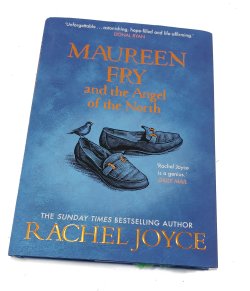 Phil: When I first picked this book up, I assumed it was a slightly crude cash-in on the film, The Unlikely Pilgrimage of Harold Fry, which has just been released ten years after we first read the book it is based on.
Phil: When I first picked this book up, I assumed it was a slightly crude cash-in on the film, The Unlikely Pilgrimage of Harold Fry, which has just been released ten years after we first read the book it is based on.
That story followed Harold, who decides to hand deliver a card to his dying friend Queenie. By walking. Hilarious (and somewhat unbelievable) japes ensue.
The author, Rachel Joyce, followed it up with The Love Song of Queenie Hennessy, which tells the story of their relationship (they were colleagues and she loved him, but never said anything) from Quennies point of view. To be honest, I think is the better of the two books. More believable than Harold Fry, and does a good job of describing the feelings you can have for someone you work closely with, but can never reveal.
Anyway, along comes the film and we have a short novel, 127 pages, centring on Harold’s wife, Maureen.
She goes on her own odyssey, by car this time, to visit a garden Queenie built before her death, at the seaside. There, she believes there to be a shrine to her and Harold’s son, David, who died by suicide due to a combination of stress and drugs.
David’s death has affected the couple in different ways – Harold went for his walk, but seems to have got over it. Maureen is eaten up by anger. Anger at Harold. Anger at the world in general, and especially, anger at Queenie, for being someone Harold cared (platonically) about.
And to be honest, this is a very angry book. Yes, there is resolution at the end, but most of it is taken up by rage, and an awful lot of detailed description. It’s a bit of a relief to get to the end and relax.
I’m sure there is commercial sense in this book, and it does neatly tie up all the characters’ lives. I’m not sure I could say I enjoyed reading it, and am glad it was short. Maybe if you want an insight into the way suicide affects those left behind, it does the job. But I suspect if you leap into it from the film, you’ll struggle to imagine that nice Penelope Wilton in the text.
